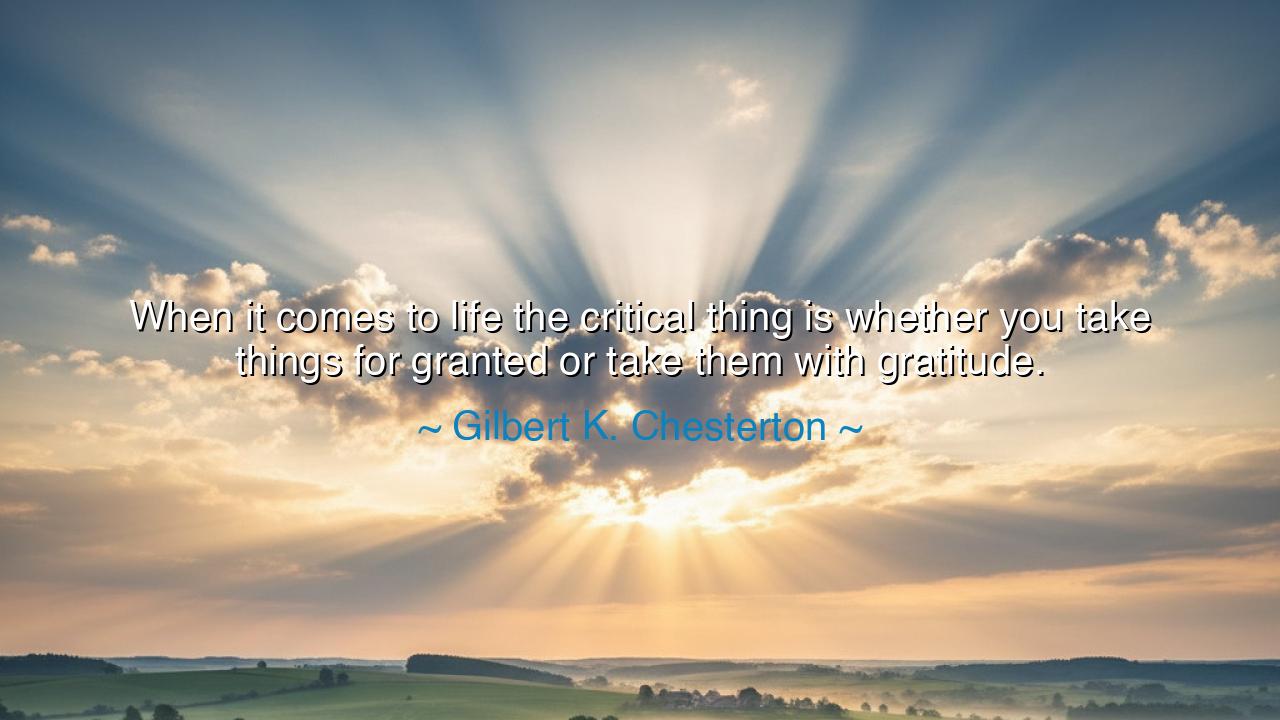
When it comes to life the critical thing is whether you take
When it comes to life the critical thing is whether you take things for granted or take them with gratitude.






The words of Gilbert K. Chesterton, “When it comes to life the critical thing is whether you take things for granted or take them with gratitude,” shine like a beacon across the centuries. They remind us of the eternal choice placed before every human heart: to live blindly, as though blessings were owed to us, or to live awake, perceiving the gifts that fill each day and responding with reverence. In this contrast lies the difference between emptiness and fulfillment, between a soul that withers and one that thrives. The ancients, too, taught that the way we behold life determines the quality of our living, for it is not events that define us, but the posture of our hearts toward them.
To take things for granted is to walk through life in a stupor, blind to the miracle of existence itself. It is the arrogance of one who eats bread and forgets the farmer, who drinks water and forgets the well, who breathes air and forgets the gift of breath. Such a person may accumulate wealth or power, but their spirit remains impoverished. The ancients warned against such forgetfulness. The Israelites, delivered from Egypt, grumbled in the desert, taking manna for granted — and in their ingratitude, they lost the joy of freedom itself. Ingratitude does not merely ignore blessings; it poisons them.
On the other hand, to take things with gratitude is to live in harmony with truth. Gratitude is the eye that sees rightly. It transforms the ordinary into the extraordinary, turning a simple meal into a feast, a humble home into a palace, a fleeting moment into eternity. Marcus Aurelius, emperor of Rome, wrote each dawn to remind himself that to awaken, to breathe, to think, to love — these were miracles greater than conquest. Gratitude does not wait for abundance; it sanctifies what is already present.
History offers us a luminous example in the life of Helen Keller. Born blind and deaf, she might have taken life as a curse, and few would have blamed her. Yet through the patience of her teacher Anne Sullivan, she learned to read, to write, to speak, and to embrace life with thankfulness. Keller declared that although she lacked sight and hearing, she was rich in joy, in friendship, and in meaning. She did not take life for granted, though much was denied her. Instead, she received it with gratitude, and her story continues to inspire millions.
Chesterton’s words also carry the weight of paradox. To take things for granted is easy, but it leaves us restless, always hungry for more. To take things with gratitude is harder, requiring humility and attention, yet it fills the heart with peace. The critical thing, then, is not what we possess but how we perceive. The same sunrise can be wasted on one who yawns and forgotten, or treasured by another who whispers thanks. The same relationship can be ignored until it withers, or honored until it flourishes. Life itself does not change; it is the attitude of gratitude that changes us.
The lesson for us is clear: gratitude is not optional, it is essential. It is the discipline that keeps the heart alive. Without it, blessings turn into burdens, and joy slips through our fingers. With it, even suffering can be transformed into wisdom, and trials into teachers. Gratitude does not deny hardship but redeems it, showing us that even in pain there are reasons to give thanks — for endurance, for lessons, for the hope that sustains us.
As practical action, begin the daily practice of thanksgiving. Each morning, name aloud three gifts in your life — however small. Each evening, reflect on the day not with complaint but with acknowledgment of what was given: the smile of a stranger, the taste of bread, the gift of breath. Write them down, so your memory becomes a treasury of gratitude. Share your thanks with others; tell them what they mean to you. In doing so, you will walk the path that Chesterton commended: the path of gratitude, the path of life.
Thus, the voice of Gilbert K. Chesterton echoes across generations: the critical thing is not the abundance of our days, but the gratitude with which we live them. To take things for granted is to waste life; to take them with gratitude is to awaken to its fullness. And in this awakening, we find joy, peace, and the wisdom to pass on to those who walk after us.






AAdministratorAdministrator
Welcome, honored guests. Please leave a comment, we will respond soon